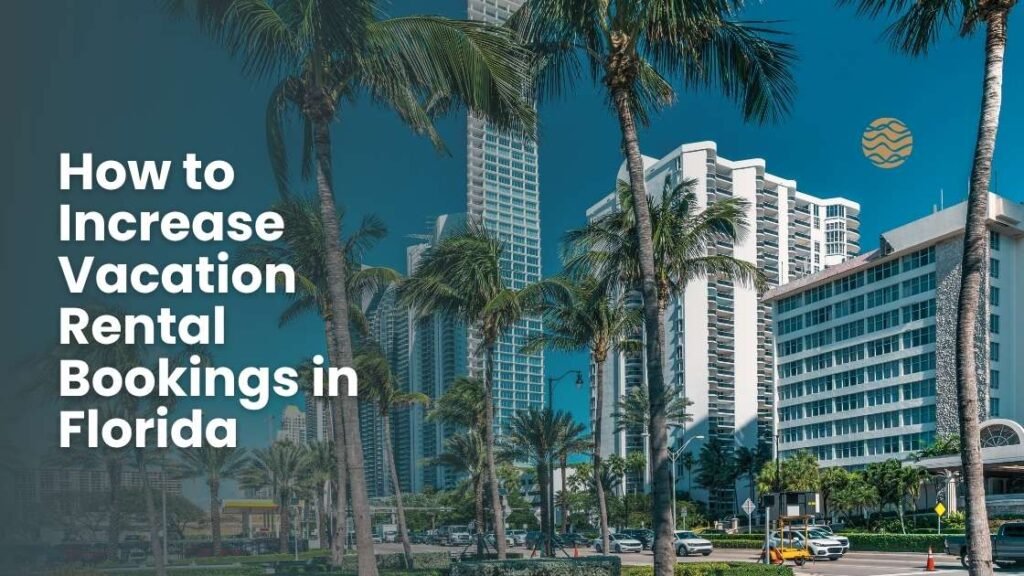Florida remains one of the most sought-after vacation destinations in the United States, drawing millions of travelers each year with its sunny beaches, vibrant cities, theme parks, and year-round warm weather. As a result, the vacation rental market in Florida is booming—but so is the competition.
Whether you’re renting out a beachside condo in Miami, a family-friendly home near Disney, or a cozy bungalow in the Keys, standing out in this saturated market is crucial. Simply listing your property isn’t enough anymore—owners and managers must actively optimize and market their rentals to secure consistent bookings.
This blog will walk you through proven, practical strategies to let you know how to increase your vacation rental bookings in Florida. From optimizing your online presence to enhancing guest experience, these tips will help you attract more guests, boost occupancy rates, and grow your rental income.
How to Increase Vacation Rental Bookings in Florida: 10 Quick Tips
Now, let’s see some proven hacks to increase your vacation rental bookings in Florida.
1. Understand Your Target Audience
Before you can increase bookings, you need to understand who you’re trying to attract. Florida welcomes a wide range of travelers—each with different needs, expectations, and booking habits. Tailoring your vacation rental to suit specific guest types can help you stand out and appeal directly to the right audience.
a. Identify Common Guest Profiles in Florida:
- Families visiting theme parks like Disney World or Universal Studios
- Retirees and snowbirds escaping cold winters up north
- Spring breakers looking for beachfront party spots
- Remote workers in search of long-term, peaceful stays with strong Wi-Fi
- Pet owners seeking pet-friendly accommodations
- Couples on romantic getaways
b. How to Use This Information:
- Highlight child-friendly features for families (crib, high chair, fenced pool)
- Emphasize peace and accessibility for retirees
- Promote strong internet and workspace for remote workers
- Add location-based keywords (e.g., “Orlando family rental” or “pet-friendly home near Naples”)
By narrowing down your ideal guest profiles and aligning your listing, pricing, and amenities with their needs, you position your property as the perfect match—not just another option.
2. Optimize Your Vacation Rental Listing
Your online listing is often your first (and only) chance to make a strong impression. A poorly written or outdated listing can turn away potential guests—even if your property is beautiful. To drive more bookings, your listing needs to be polished, clear, and engaging.
a. Use High-Quality, Professional Photos
Showcase every room with bright, well-lit images. Highlight key features (pool, view, kitchen, outdoor space). Also, include exterior shots and nearby attractions. Consider aerial or twilight photos for extra appeal
Tip: The first 5 photos are the most viewed—make them count.
b. Write a Compelling, Keyword-Rich Description
You can tell a story about the guest experience (“Wake up to ocean breezes…”). Also, use local keywords like “Gulf Coast retreat” or “Orlando vacation home”. Break the text into sections: overview, amenities, location highlights, rules.
c. Highlight Unique Selling Points
Is your rental having Private beach access? Kayaks included? Smart home features? Don’t just list these unique amenities—explain the value they add. Also, mention what’s nearby such as theme parks, beaches, golf courses, nature trails.
d. Ensure Accuracy and Transparency
Double-check that amenities, capacity, and house rules are up-to-date. Use bullet points for easy readability. Make sure to avoid overselling—set clear expectations to avoid negative reviews. A well-optimized listing does more than inform—it builds trust and inspires guests to hit “Book Now.”
3. Leverage the Power of SEO
Search Engine Optimization (SEO) isn’t just for websites—it’s a game-changer for vacation rental visibility. Whether you’re using platforms like Airbnb and Vrbo or managing your own booking website, SEO helps ensure your listing shows up when potential guests search for properties like yours.
a. Use Location-Based Keywords
Incorporate specific geographic terms that travelers search (e.g., “Naples beachfront condo,” “family rental near Disney World,” or “panhandle vacation cabin”). Sprinkle these naturally in your title, description, and headings.
b. Optimize Listing Titles and Meta Descriptions
Listing title example: “Pet-Friendly Tampa Bay Home with Pool – 5 Mins from Beach”. Meta descriptions (on websites) should be enticing and keyword-rich. Avoid generic titles like “Nice House in Florida”—be specific and unique
c. Add Fresh, Relevant Content
Regularly update your listing description with seasonal features (“Enjoy summer fireworks from your balcony!”). If you have your own site, post local travel guides, blogs, or event updates to boost SEO. Mention nearby landmarks, restaurants, or events
d. Don’t Forget Mobile Optimization
Most guests book via mobile—make sure your website or listing is responsive. Ensure fast loading speed and simple navigation help keep users engaged.
4. Boost Visibility with Multi-Platform Listings
Relying on a single booking platform limits your reach. To maximize exposure and increase vacation rental bookings in Florida, it’s crucial to list your property across multiple platforms where potential guests are searching.
a. List on Multiple Booking Sites
- Top platforms: Airbnb, Vrbo, Booking.com, Expedia, TripAdvisor
- Niche platforms: FloridaRentals.com, Kid & Coe (for family travel), or BringFido (for pet-friendly stays)
Each site caters to different audiences—expand your reach by being on several
b. Sync Your Calendars with a Channel Manager
Avoid double bookings by using tools like Hostaway, Guesty, or Lodgify. Sync availability, rates, and messages in one place to saves time and reduces human error.
c. Customize Listings for Each Platform
Tailor your tone, title, and description based on the platform’s audience
(e.g., more casual on Airbnb, more professional on Booking.com). Highlight features relevant to each site’s users
d. Monitor Performance
Track which platforms generate the most traffic and bookings. Adjust your investment and marketing strategy accordingly. By spreading your presence across the right platforms and managing them efficiently, you significantly increase your visibility—and your chances of filling your calendar.
5. Encourage and Manage Guest Reviews
Positive guest reviews are one of the most powerful tools for increasing bookings. In fact, travelers are far more likely to choose a rental with social proof over one without. That’s why actively managing and encouraging reviews is key to building trust and boosting your visibility.
a. Ask for Reviews Promptly
Send a friendly, personalized message after check-out thanking the guest and asking for a review. Some platforms automate review requests—use them to your advantage. Consider including a reminder in your welcome book or departure note
b. Respond to All Reviews—Good or Bad
- Positive reviews: Thank the guest by name and show appreciation
- Negative reviews: Stay calm, acknowledge concerns, and explain how you’ll address them
Show potential guests that you’re professional and responsive
c. Highlight Top Reviews in Your Marketing
Feature glowing testimonials on your social media or direct booking website. Use quotes in photo captions or descriptions. A strong review can speak louder than your own sales pitch
d. Improve Based on Feedback
- If multiple guests mention slow Wi-Fi or outdated furniture—take action
- Treat reviews as a valuable source of insight for upgrades or changes
Guest reviews not only influence booking decisions—they also impact your ranking on platforms like Airbnb and Vrbo. Keep your reviews flowing and your responses thoughtful, and you’ll quickly build a reputation that draws more guests.
6. Offer Competitive Pricing with Smart Strategies
Price is often the deciding factor for travelers comparing similar vacation rentals. But that doesn’t mean you need to be the cheapest option—you just need to price smart. Using data-driven strategies can help you maximize occupancy and profitability.
a. Use Dynamic Pricing Tools
Tools like PriceLabs, Wheelhouse, or Beyond adjust your rates based on demand, season, and competition. Automatically increase prices for holidays or high-demand weekends. Lower prices for last-minute gaps to avoid vacancies.
b. Monitor Your Competitors
Research similar rentals in your area: What are they charging per night? What amenities do they offer? Also, adjust your rates to stay competitive without undercutting your value.
c. Offer Strategic Discounts
- Longer stay discounts: Weekly or monthly rates attract snowbirds and remote workers
- Last-minute deals: Fill open dates within 7 days of check-in
- Repeat guest or referral discounts: Encourage loyalty and word-of-mouth marketing
d. Price Based on Seasonality
Florida has peak seasons (winter, spring break, summer) and slower months (late fall, hurricane season). Increase rates during high-demand periods but stay flexible during off-season to attract more bookings.
7. Enhance Guest Experience for Better Retention and Referrals
A great first impression leads to glowing reviews, repeat stays, and referrals. When guests feel truly cared for, they’re more likely to return—and tell others. In a competitive market like Florida, guest experience is your secret weapon.
a. Go Beyond Expectations
Leave a welcome gift like snacks, or local coffee. Provide a personalized welcome note with check-in details and tips. Offer a local guidebook with nearby attractions, dining, and hidden gems
b. Focus on Cleanliness and Comfort
Hire professional cleaners and inspect regularly. Stock quality linens, towels, and toiletries. Also, ensure temperature control works well—especially in Florida’s heat.
c. Provide Hassle-Free Check-In/Out
Use smart locks, keypads, or lockboxes for flexible self check-in. Send clear, friendly instructions in advance. Offer early check-in or late check-out when possible.
d. Anticipate Guest Needs
For this ensure the following things:
- Fast Wi-Fi and workspace for remote workers
- Beach towels, chairs, and umbrellas for coastal rentals
- Baby gear or board games for families
e. Stay Accessible During the Stay
Respond quickly to questions or issues. Moreover, offer 24/7 support (or a local contact) in case of emergencies. A good host presence makes guests feel secure and supported.
8. Use Social Media and Digital Marketing

a. Create a Social Media Presence
Set up dedicated profiles on Instagram, Facebook, and even TikTok. Post high-quality photos and videos of your property, nearby attractions, and guest experiences. Use relevant hashtags like #FloridaVacationRental, #BeachHouseFlorida, or #OrlandoAirbnb.
b. Share Consistently with Engaging Content
Post a mix of behind-the-scenes, guest reviews, seasonal promotions, and local events. Share tips and local guides to provide value, not just ads. Use Instagram Reels or Facebook Stories to boost reach.
c. Run Targeted Ads
Use Facebook and Instagram Ads to target people planning trips to Florida. Set filters by age, interest, location, or travel intent. Promote special offers or availability during slower months.
d. Collaborate with Local Influencers or Bloggers
Offer a discounted stay in exchange for promotion. Partner with travel content creators who align with your ideal guest profile. Encourage guests to tag you in their posts—user-generated content builds trust.
e. Drive Traffic to Your Booking Site
Add your website or direct booking link to all social media bios. Use call-to-actions like “Book Direct & Save!”. Share booking updates, available dates, and last-minute deals.
9. Build a Direct Booking Website
While listing platforms like Airbnb and Vrbo bring bookings, they also charge fees that cut into your profits. Building your own direct booking website helps you avoid these fees, build a loyal guest base, and create a brand that stands out in Florida’s vacation rental market.
a. Key Features Your Website Should Have
Easy-to-use booking engine with real-time calendar and secure payment options. Mobile-friendly design for travelers booking on phones and tablets. Clear photos, detailed descriptions, and guest reviews.
b. Optimize Your Website for SEO
Use targeted local keywords to help your site appear in search engines (e.g., “Florida Keys vacation rental”). Include a blog with helpful content like local events, travel tips, and seasonal guides. Use fast loading speeds and simple navigation
c. Build an Email List
Offer special discounts or insider tips in exchange for email sign-ups. Send newsletters with seasonal promotions, last-minute availability, and updates. Email marketing builds repeat business and direct communication with guests
d. Connect With Your Guests
Provide a contact form or chat feature for questions. Also, include FAQs about your property and booking process. Make it easy to book directly without relying on third-party platforms
10. Embrace Seasonal Promotions and Events
Florida’s tourism fluctuates with seasons, holidays, and special events. Leveraging these can fill your calendar and attract guests looking for unique experiences.
a. Target Key Seasons
- Winter escapes: Market to snowbirds seeking warm weather
- Spring break: Highlight family-friendly or party-friendly options near beaches and theme parks
- Summer vacations: Promote pool and water activities, outdoor dining, and local festivals
b. Offer Special Packages
Create themed offers around holidays like Christmas, Thanksgiving, or Fourth of July. Partner with local businesses for bundled deals (e.g., discounted tickets to attractions, restaurant vouchers). Promote event-specific stays during golf tournaments, boat shows, or music festivals.
c. Use Time-Limited Discounts
Early bird specials for advance bookings. Last-minute deals to fill gaps in your calendar. Encourage longer stays during slower months with discounts.
d. Promote Your Offers Strategically
Feature seasonal promotions prominently on your website and social media. Update listing descriptions to reflect current offers. Send targeted emails to past guests with personalized deals.
Conclusion
Increasing vacation rental bookings in Florida takes effort—but by understanding your audience, optimizing your listing, leveraging SEO, and focusing on guest experience, you’ll see your calendar fill up faster than ever.
Consistency, smart pricing, and active marketing are the keys to staying ahead in a competitive market. Use these strategies, adapt to trends, and watch your rental business thrive.




